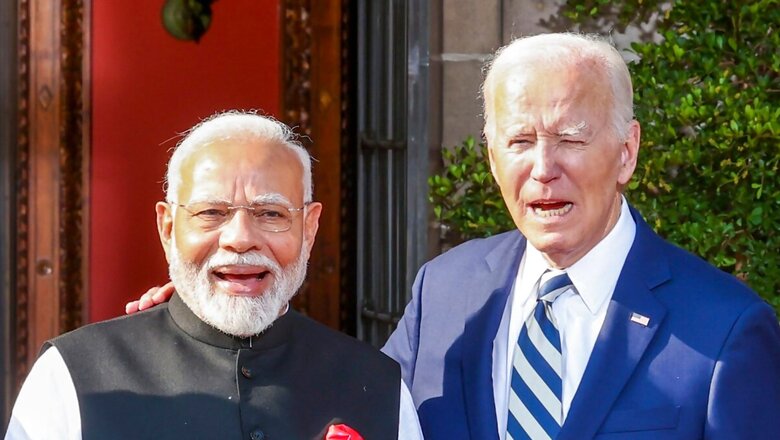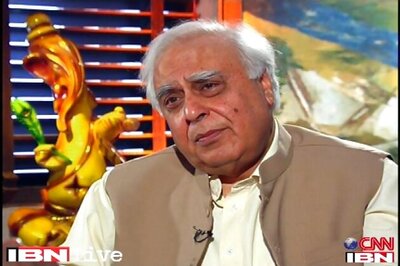
views
The Wilmington Quad summit was also the venue of a summit between Prime Minister Narendra Modi and President Joe Biden. It was an occasion for an outgoing US President and an Indian Prime Minister at the commencement of his third term to take stock of India-US ties and lay the groundwork for them for the period ahead. India has bipartisan support in the US, and so whether Kamala Harris or Donald Trump wins, it can be reasonably expected that the outcome of the summit at Wilmington will guide the relationship in various domains going ahead.
The joint statement issued on the occasion of the summit affirmed that the US-India Comprehensive Global and Strategic Partnership, the defining partnership of the 21st century, is decisively delivering on an ambitious agenda that serves the global good. To describe the partnership as a defining one for the 21st century suggests that it will continue on its upward trajectory till the end of the century and define the international landscape for the next 76 years. This is no doubt hyperbolic, but the rhetoric suggests a great deal of confidence in the long term future of ties.
To claim that the US and India have reached unprecedented levels of trust and collaboration is true if we compare the position today with the lack of trust and limited collaboration from 1947 to the signing of the nuclear deal in 2005. The US-India partnership is still buffeted by issues of human rights, and democracy, etc, and hence the text of the joint statement says that this partnership must be anchored in upholding democracy, freedom, the rule of law, human rights, pluralism, and equal opportunities for all. This is a way to bring in sensitive issues on which there are differences between the two sides. The caveat “as our countries strive to become more perfect unions” is an acknowledgement that the US too has to progress on these issues.
The joint statement commends the progress that “has made the US-India Major Defense Partnership a pillar of global security and peace”. This is an exaggeration, as India is not a military ally and NATO and other alliances of the US constitute far more important pillars of global security and peace for America. It is true though that India-US defence cooperation has acquired very significant dimensions.
In the joint statement President Biden has been copious in his praise for India’s leadership on the world stage, particularly Prime Minister Modi’s leadership in the G-20 and in the Global South and his commitment to strengthen the Quad to ensure a free, open, and prosperous Indo-Pacific. This praise comes in the wake of India’s concerns about US unwillingness to curb pro-Khalistani elements, the White House receiving such elements just before Modi’s visit, the embarrassing summons issued to India’s National Security Adviser over the Pannun affair, and Indian concerns about the US role in the change of regime in Bangladesh.
India, Biden says, is at the forefront of efforts to seek solutions to the most pressing challenges, from supporting the global response to the Covid-19 pandemic to addressing the devastating consequences of conflicts around the world. While India’s role in vaccine delivery during the Covid-19 crisis was exemplary, its role in addressing the conflicts around the world in which the US itself is deeply involved depends on the lead the US itself takes to address them. So far, whether in the Ukraine conflict or those in Gaza and Lebanon, or still those in the Red Sea area, India’s role has been limited.
President Biden commended Prime Minister Modi for his historic visits to Poland and Ukraine, the first by an Indian Prime Minister in decades, and for his message of peace and ongoing humanitarian support for Ukraine, including its energy sector. It is not clear what support India has given to Ukraine’s energy sector. Besides that, Biden’s praise for Modi’s visit to Poland and Ukraine can be misunderstood to mean that India was remiss in not visiting these two countries before, and some may interpret these visits as a gesture to the US.
Both India and the US have vital interest in the freedom of navigation and the protection of commerce, including in the protection of critical maritime routes in the Middle East where India will assume co-lead in 2025 of the Combined Task Force 150 to work with Combined Maritime Forces to secure sea lanes in the Arabian Sea. The joint statement notes this.
According to the joint statement, Biden shared with Modi that the United States supports initiatives to reform global institutions to reflect India’s important voice, including permanent membership for India in a reformed UN Security Council. But the US has made it clear separately that it opposes veto rights for the new permanent members.
The two leaders have applauded the success of the Initiative on Critical and Emerging Technology (iCET) in deepening and expanding strategic cooperation across key technology sectors, including space, semiconductors, advanced telecommunications, artificial intelligence, quantum, biotechnology, and clean energy.
They have highlighted ongoing efforts to strengthen collaboration with like-minded partners, including through the Quad and a US-India-ROK Trilateral Technology initiative launched earlier this year to build more secure and resilient supply chains for critical industries.
There is a call to redoubling efforts to address export controls, enhance high technology commerce, and reduce barriers to technology transfer between India and the US, while addressing technology security, including through the India-US Strategic Trade Dialogue. Progress so far has been slow, as US barriers to technology transfers are in layers and are extremely complex.
New mechanisms for deeper cyberspace cooperation through the bilateral cybersecurity dialogue, expanding the manufacturing and deployment of clean energy, including cooperation in solar, wind and nuclear energy and the development of small modular reactor technologies, are areas of mutual interest identified in the joint statement.
In the technology area, the joint statement is full of new initiatives. The two leaders have rightly hailed a watershed arrangement to establish a new semiconductor fabrication plant focused on advanced sensing, communication, and power electronics for national security, next generation telecommunications, and green energy applications. The fab, which will be established with the objective of manufacturing infrared, gallium nitride and silicon carbide semiconductors, will be enabled by support from the India Semiconductor Mission as well as a strategic technology partnership between Bharat Semi, 3rdiTech, and the U.S. Space Force. This is potentially a major step forward in an area of priority for India.
Biden and Modi have praised combined efforts to facilitate resilient, secure, and sustainable semiconductor supply chains including through Global Foundries’ (GF) creation of the GF Kolkata Power Center in Kolkata, that will enhance mutually beneficial linkages in research and development in chip manufacturing and enable game-changing advances for zero and low emission as well as connected vehicles, internet of things devices, AI, and data centres. They also applauded the new strategic partnership between the U.S. Department of State and the India Semiconductor Mission, Ministry of Electronics and Information Technology in connection with the International Technology Security and Innovation (ITSI) Fund.
The two leaders have welcomed progress toward the first joint effort by NASA and ISRO to conduct scientific research onboard the International Space Station in 2025.
To enhance collaboration between the US and Indian research and development ecosystems, the two sides plan to mobilize up to $90+ million in U.S. and Indian government funding over the next five years for the U.S.-India Global Challenges Institute to support high-impact R&D partnerships between US and Indian universities and research institutions. The two leaders also welcomed the launch of a new US-India Advanced Materials R&D Forum to expand collaboration between American and Indian universities, national laboratories, and private sector researchers.
The joint statement notes funded projects between the National Science Foundation and India’s Department of Science and Technology, the Ministry of Electronics and Information Technology and the Department of Biotechnology to enable joint US.-India basic and applied research in the areas of semiconductors, next generation communication systems, sustainability & green technologies and intelligent transportation systems, as well as address complex scientific challenges and innovate novel solutions that leverage advances in synthetic and engineering biology, systems and computational biology, and other associated fields that are foundational to developing future biomanufacturing solutions and advance the bioeconomy.
The second convening of the US-India Quantum Coordination Mechanism in Washington in August figures in the joint statement which welcomes the announcement of seventeen new awards for binational research and development cooperation on artificial intelligence and quantum via the US-India Science and Technology Endowment Fund (IUSSTF).
On the defence procurement side, Biden welcomed the progress towards India concluding procurement of 31 General Atomics MQ-9B (16 Sky Guardian and 15 Sea Guardian) remotely piloted aircraft and their associated equipment. Biden and Modi have recognised the remarkable progress under the US-India Defence Industrial Cooperation Roadmap, including ongoing collaboration to advance priority co-production arrangements for jet engines, munitions, and ground mobility systems, though there is an irksome delay in supply of Ge 404 engines for India’s LCA MK 1 jets.
The two leaders have applauded the recent conclusion of the Security of Supply Arrangement (SOSA), enhancing the mutual supply of defence goods and services. It is not a binding agreement.
India’s decision to set a uniform Goods and Services Tax (GST) of 5 percent on the maintenance, repair, and overhaul (MRO) sector, including on all aircraft and aircraft engine parts thereby simplifying the tax structure and paving the way for building a strong ecosystem for MRO services in India has been welcomed by Biden. The two leaders welcomed commitments from U.S. industry to further increase India’s MRO capabilities, including for the repair of aircraft and unmanned aerial vehicles. This includes the teaming agreement on the C-130J Super Hercules aircraft recently signed between Lockheed Martin and Tata Advanced Systems Limited to establish a new Maintenance, Repair and Overhaul (MRO) facility in India to support the readiness of the Indian fleet and global partners who operate the C-130 Super Hercules aircraft.
Modi and Biden have lauded the growing defence innovation collaboration between the governments, businesses, and academic institutions of the two countries fostered by the India-US Defence Acceleration Ecosystem (INDUS-X) initiative launched in 2023, and noted the progress achieved during the third INDUS-X Summit in Silicon Valley earlier in September.
Modi and Biden have welcomed ongoing efforts to deepen military partnership and interoperability to maintain a free and open Indo-Pacific, with India hosting the most complex, largest bilateral, tri-service exercise to date during the March 2024 TIGER TRIUMPH exercise.
India will deploy the first Liaison Officer from India in US Special Operations Command (SOCOM).
The November 2024 bilateral cyber engagement will enhance the U.S.-India cyber cooperation framework.
As part of the US-India Roadmap to Build Safe and Secure Global Clean Energy Supply Chains, the U.S. and India would work together to unlock $1 billion of multilateral financing to support projects across the clean energy value chain for the renewable energy sector. The two leaders welcomed collaboration on a new National Centre for Hydrogen Safety in India.
A new Memorandum of Cooperation has been signed between the US Agency for International Development and the International Solar Alliance aimed at promoting more responsive and sustainable power systems that leverage diverse renewable energy sources.
The two leaders reaffirmed their commitment to accelerate the development of diverse and sustainable supply chains for critical minerals under the Minerals Security Partnership. They looked forward to the signing of the Critical Minerals Memorandum of Understanding at the forthcoming US-India Commercial Dialogue.
The two leaders welcomed the formal launch of the new US-India Global Digital Development Partnership, which aims to bring together US and Indian private sector companies, technology and resources to deploy the responsible use of emerging digital technologies in Asia and Africa.
The Leaders welcomed strengthened trilateral cooperation with Tanzania through the Triangular Development Partnership, led by the US Agency for International Development and India’s Development Partnership Administration with a focus on advancing renewable energy projects, including solar energy, to enhance energy infrastructure and access in Tanzania.
The two sides also announced a Roadmap for the US-India Initiative to Build Safe and Secure Global Clean Energy Supply Chains.
Obviously, a lot of preparatory work was done to make the Modi-Biden summit substantial in terms of progress on several fronts, with a strong emphasis on technology cooperation across many sectors.
Kanwal Sibal is a former Indian Foreign Secretary. He was India’s Ambassador to Turkey, Egypt, France and Russia. Views expressed in the above piece are personal and solely that of the author. They do not necessarily reflect News18’s views.



















Comments
0 comment